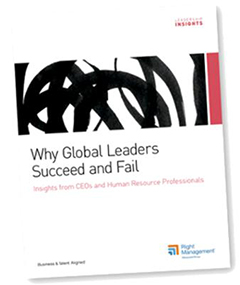When Right Management and Chally Group surveyed business leaders for Why Global Leaders Succeed and Fail, they looked at a number of aspects of the development and survival of CEOs in a variety of businesses worldwide.
 An early discovery was that most CEOs come from operational or financial backgrounds. It is only partially clear why that might be. “If all leadership roles required the same skill set, we would expect all functional areas to be equally represented. If all positions required the same skill set as the CEO position, then all individuals from all functions should have similar skill sets. We would assume that people are promoted to CEO from Operations and Finance because they are perceived to have developed competencies that are important for the CEO role.”
An early discovery was that most CEOs come from operational or financial backgrounds. It is only partially clear why that might be. “If all leadership roles required the same skill set, we would expect all functional areas to be equally represented. If all positions required the same skill set as the CEO position, then all individuals from all functions should have similar skill sets. We would assume that people are promoted to CEO from Operations and Finance because they are perceived to have developed competencies that are important for the CEO role.”
In the case of financial people it may be that, in their rise to the top, they are exposed to all the business functions or divisions within the company giving them a broad overview of the business. Operations people are familiar with all the company’s products and services, and salespeople are familiar with all customer segments. Of course, these individuals may have been rotated through these functional management roles because they were originally chosen for their potential to rise to the top of the business.
Interestingly, in either case, “there is strong evidence that suggests that different leadership roles require different sets of competencies, and experience in functional roles in itself does not prepare one particularly well for succession to CEO.”
The competencies deemed most critical for success, according to the report are
- Creating a Strategic Vision (91.7%)
- Inspiring Others and Maintaining Leadership Responsibility (62.3%),
- Developing an Accurate and Comprehensive Overview of the Business (56.9%) and
- Decision Making (54.5%)
The Chief Executive role shared two critical competencies with the Operational role and one critical competency with the FD/CFO position. The Operational position emphasized Developing an Accurate and Comprehensive Overview of the Business and Decision Making whilst the CFO position had only Developing an Accurate and Comprehensive Overview of the Business as critical. “The fact that only one or two competencies overlap may also suggest why succession, even from these “closest” functions, may fail.” the report suggests
The report authors asked HR professionals the factors most likely to contribute to the failure of senior leaders in their organisations.
The top 5 were –
- Fails to Build Relationships and a Team Environment 40.2%
- A Mismatch for the Corporate Culture 32.4%
- Failure to Deliver Acceptable Results 25.1%
- Unable to Win Company Support 25.1%
- Lack of Appropriate Training 23.5%
From those results it is clear that there are improvements to be made in the succession planning and recruitment processes. Promotion from within (which we cover in another article on Success in Succession Planning in this newsletter) would ensure that some of those issues could be overcome or avoided. Where recruitment is necessary, it is not just competencies but also chemistry that should be considered. “It may mean that the selection criteria were inadequate and focused too much on experience and job knowledge with too limited a concern for readiness from the “people management” side of the leader’s new responsibilities.”
The report highlights another area that needs attention in some firms. When new employees are taken on at most levels, there is an induction (what the report calls onboarding) process. That is often not true at CEO level as the report’s Paradox 3 notes. “If leadership success is accepted as being critical to an organisation’s performance, why is so little support given to leader on-boarding and early development?” They ask if leaders need a deliberate and effective on-boarding process to integrate them into a new level of responsibility even if they are internally promoted and characterise the current position as a “sink or swim” approach suggesting that some organizations assume that selecting the right individual is sufficient. “They may assume that if they made the right selection, the individual will immediately assume responsibility for his or her own success.”
Leaders need to be readied for new responsibility, supported as they take it on and, crucially, developed throughout their tenure in the role. It is in these areas that The Academy for Chief Executives can provide experiential learning and peer support to new and existing Chief executives and senior member of the executive team.
—————-
More about –
Right Management – www.right.com
The Leadership Insights report Why Global Leaders Succeed and Fail from Right Management can be downloaded from http://www.right.com/globalleadershipstudy (registration required).
Academy for Chief Executives – www.chiefexecutive.com Twitter.